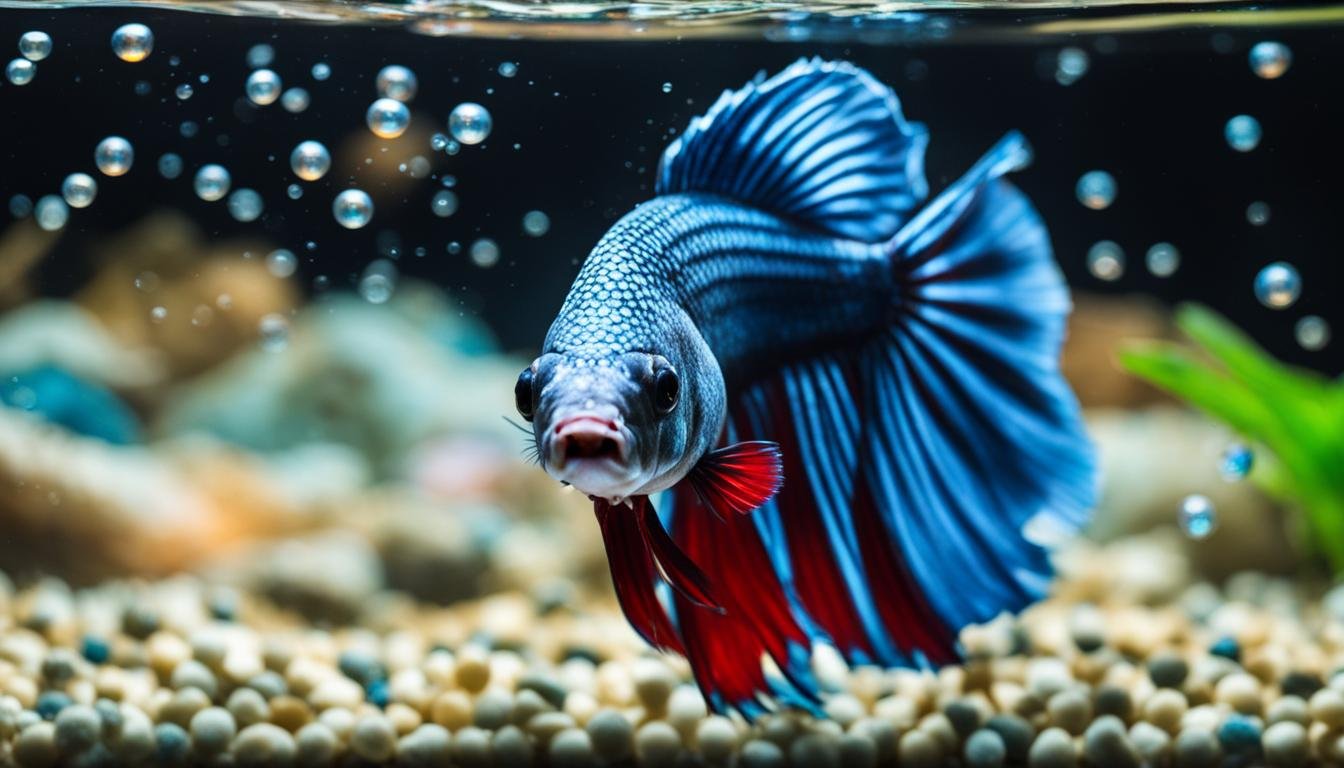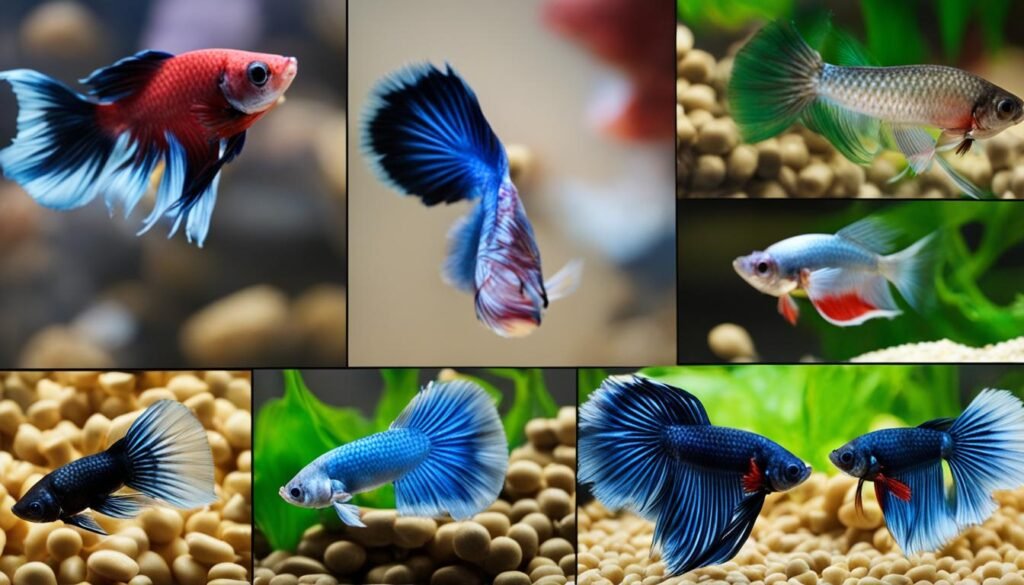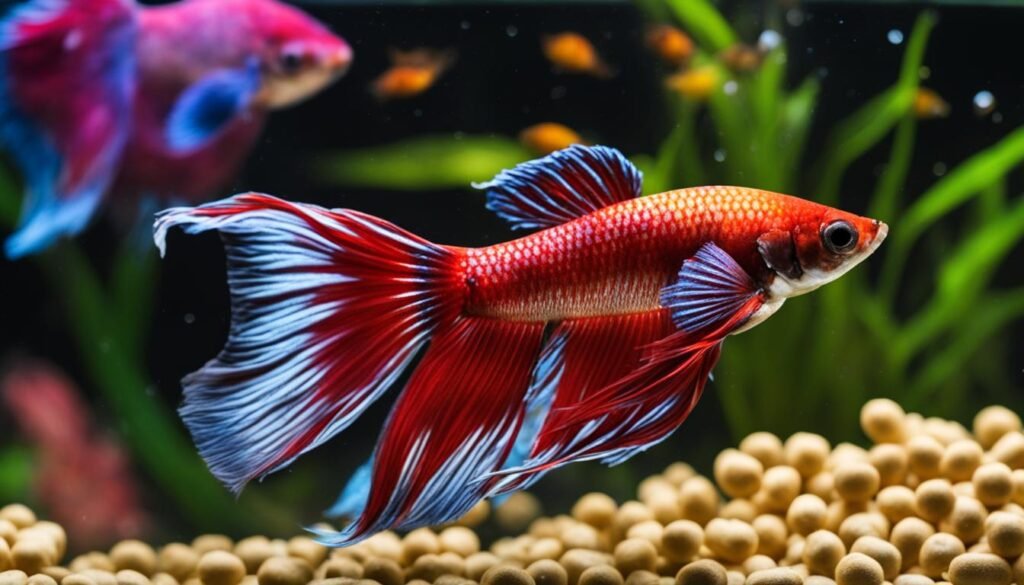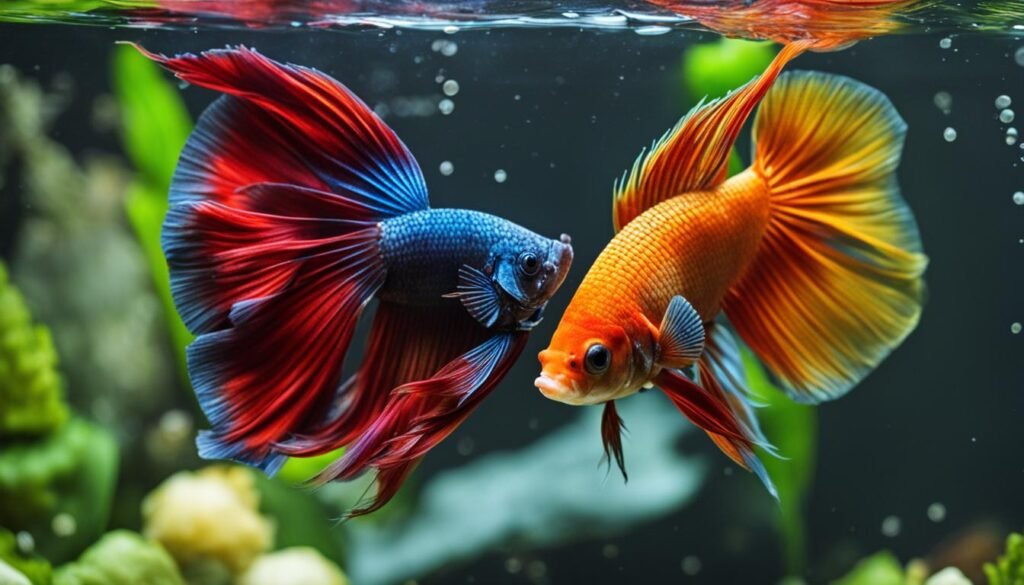Your cart is currently empty!

Understanding Why Is My Betta Fish Spitting Out Food
It can be concerning to witness your betta fish spitting out their food, but rest assured, it’s not always a cause for alarm. Bettas are notorious for being picky eaters and may have preferences when it comes to the texture and size of their food. This behavior is actually quite normal for betta fish, and there are several reasons why they may spit out their food.
So, why is your betta fish spitting out food? Let’s delve into the details and find out what might be going on.
Key Takeaways:
- Betta fish spitting out food is a common behavior and not always a cause for concern.
- Bettas can be picky eaters and may not like certain textures or sizes of food.
- Spitting out food is a normal mechanism for betta fish to break down and soften their food.
- If accompanied by other symptoms of illness, spitting out food may indicate a health issue.
- Providing a proper diet and monitoring your betta’s overall health can help address any concerns.
Is Spitting Out Food a Normal Behavior in Betta Fish?
Many betta fish owners may be concerned when they see their beloved pet spitting out their food. However, it is important to understand that this behavior is actually quite normal in betta fish and is not usually a cause for alarm. In fact, most species of fish, including bettas, have a natural instinct to spit out their food before fully consuming it.
One of the main reasons why betta fish spit out their food is because of their small mouths. Bettas have relatively tiny mouths compared to the size of some food pellets or flakes. As a result, they may struggle to swallow larger pieces of food and resort to spitting them out. This behavior serves as a way for bettas to break down the food into smaller, more manageable pieces that can be easily consumed.
It’s also worth noting that bettas can be picky eaters. They may have preferences for certain textures or sizes of food, and if a particular food does not meet their preferences, they may choose to spit it out. This is similar to how humans may not enjoy certain foods and choose to reject or spit them out. Therefore, if your betta fish spits out their food occasionally, it is often nothing to worry about.
However, it is important to observe your betta fish closely for any additional signs of illness or distress. If your betta refuses to eat for an extended period or exhibits other symptoms such as lethargy, fin rot, or abnormal swimming behavior, it may be a cause for concern. In such cases, it is best to consult with a veterinarian who specializes in fish care to ensure the health and well-being of your betta fish.
Summary:
- Betta fish spitting out food is a normal behavior.
- It happens because of their small mouths and the need to break down larger food pieces.
- Bettas can be picky eaters and may reject food that does not meet their preferences.
- Monitor your betta for additional signs of illness or distress.
- Consult with a fish care veterinarian if you notice prolonged loss of appetite or other concerning symptoms.
The 5 Reasons Bettas Spit Out Their Food

When you notice your betta fish spitting out their food, it may be concerning, but it is often not a cause for alarm. Bettas are known for being picky eaters, and there are several reasons why they may spit out their food.
1. They do not like the texture of the food:
Bettas can be particular about the textures of their food. They may not enjoy certain types of pellets or flakes, causing them to spit out the food.
2. The food is too large:
Due to their small mouths, bettas may have difficulty swallowing larger pellets or flakes. They may spit out the food to break it down into smaller, more manageable pieces.
3. The food does not smell good:
Bettas are attracted to their food by its scent. If the food does not have an appealing smell to them, they may spit it out.
4. Your betta is unwell:
Illnesses such as constipation or parasites can cause bettas to spit out their food instead of eating it. It is important to monitor your betta’s overall health and look for other symptoms of illness.
5. Your betta is in an improper environment:
If the water temperature or water parameters are not suitable for your betta fish, they may refuse to eat and spit out their food. It is crucial to ensure that your betta’s tank conditions are ideal for their well-being.
Understanding the reasons behind your betta fish spitting out their food can help you address any concerns and ensure their nutritional needs are met. By providing a variety of suitable food options and maintaining a healthy tank environment, you can help promote your betta’s overall well-being and appetite.
Choosing a Good Food for Your Betta Fish
When it comes to feeding your betta fish, it’s important to choose a good quality food that meets their specific dietary needs. Betta fish are carnivores, which means they require a diet rich in meat-based protein. While some fish may enjoy plant matter or algae, bettas have no interest in these foods and should not be fed them.
To ensure your betta fish receives the proper nutrition, look for a commercial diet specifically formulated for bettas. These foods are designed to provide the necessary ingredients for carnivorous fish and will help keep your betta healthy and happy. Avoid any food that contains a significant amount of plant matter, as this may cause your betta to spit out their food and potentially lead to nutritional deficiencies.
Important Considerations for Choosing Betta Fish Food:
- Protein Content: Betta fish require a high-protein diet, so choose a food with a protein content of at least 35% to 40%.
- Fat Content: Look for a food with a low fat content, ideally less than 10%.
- Fiber Content: Betta fish have a short digestive tract, so opt for a food with a fiber content between 2.0% and 6.0% to aid digestion.
- Moisture Content: Foods with a moisture content of 5% to 12% are ideal for bettas.
- Ash Content: Keep the ash content low, preferably below 15%, to minimize the risk of kidney problems.
- Phosphorous Content: Ensure the food contains a minimum of 0.3% to 0.9% phosphorus for overall health and development.
By choosing a good quality food that meets these criteria, you can provide your betta fish with the nutrition they need to thrive. Remember to always feed your betta fish in appropriate portions and monitor their overall health and behavior for any signs of illness or nutritional deficiencies.
Betta Fish Nutritional Analysis

Proper nutrition is vital for the overall health and well-being of betta fish. Understanding the nutritional requirements of bettas can help ensure that they receive a balanced diet that promotes their growth and longevity. Here is a breakdown of the key nutritional components that should be considered when selecting betta fish food:
Crude Protein
Protein is an essential component of the betta fish diet. It helps support muscle development, tissue repair, and overall growth. When choosing betta fish food, look for options that have a protein content ranging from 35% to 40%. This ensures that your betta receives an adequate amount of protein to meet its nutritional needs.
Crude Fat
Fat is another important nutrient for bettas, providing them with a source of energy. However, it is crucial to keep the fat content in their diet relatively low to prevent obesity and related health issues. Opt for betta fish food that has a crude fat percentage below 10.0% to maintain a balanced diet for your fish.
Crude Fiber
Fiber aids in digestion and helps keep the betta’s digestive system healthy. Including a small amount of fiber in their diet can be beneficial. Look for betta fish food with a crude fiber content ranging from 2.0% to 6.0%. This ensures that they receive the necessary fiber without overloading their digestive system.
Moisture, Ash, and Phosphorous
In addition to protein, fat, and fiber, it is essential to consider the moisture, ash, and phosphorous content of betta fish food. Moisture levels should be no higher than 5% to 12% to prevent excessive water content in their diet. Keep the ash content below 3% to 15% to avoid an excessive mineral load. Finally, ensure that the phosphorous content is within the range of 0.3% to 0.9% to support bone health and overall metabolism.
Providing a well-balanced diet that meets these nutritional requirements is crucial for the health and vitality of your betta fish. By selecting high-quality betta fish food and considering their specific nutritional needs, you can ensure that your betta receives the essential nutrients it needs to thrive.
Foods to Avoid Feeding Betta Fish

While it is important to provide a proper diet for your betta fish, there are certain foods that should be avoided. These foods may not be appealing to bettas and can lead to them spitting out their food. Here are some foods that you should steer clear of:
- Algae: Although betta fish may consume some algae in their natural habitat, it is not a substantial part of their diet. Feeding them too much algae can cause digestive issues and may result in them spitting out their food.
- Live plants: While live plants can provide enrichment and oxygenation in a betta tank, they are not an appropriate food source for bettas. They lack the necessary nutrients and can be difficult for bettas to digest, leading to food rejection.
- Omnivore foods: Betta fish are carnivores and should not be fed omnivore foods that contain a mixture of plant and animal matter. These foods may not meet the nutritional needs of bettas and can lead to spitting out of food.
- Flakes: Flake foods are commonly used for feeding fish, but bettas may not find them appealing. The texture and size of flakes can make it difficult for bettas to consume, resulting in them spitting out their food.
- Bottom feeder pellets: While bottom feeder pellets may be suitable for other species of fish, they are not recommended for bettas. These pellets are typically designed to sink, and bettas may have difficulty consuming them, causing food rejection.
- Goldfish foods: Goldfish foods are formulated specifically for the dietary needs of goldfish and are not appropriate for bettas. Feeding bettas with goldfish foods can lead to digestive issues and spitting out of food.
Summary
It is important to provide a proper diet for your betta fish to ensure their health and well-being. Avoid feeding bettas foods such as algae, live plants, omnivore foods, flakes, bottom feeder pellets, and goldfish foods, as these may not be appealing to bettas and can lead to them spitting out their food. Stick to a high-quality commercial diet formulated specifically for bettas to meet their nutritional needs. By being mindful of what you feed your betta, you can help prevent food rejection and promote their overall health.
Loss of Appetite and When to Worry
If your betta fish is not eating and spitting out their food, it can be a sign of loss of appetite. While some occasional spitting out of food is normal behavior for bettas, persistent refusal to eat can indicate an underlying issue. It is important to monitor your betta’s behavior and overall health to determine if there is cause for concern.
When your betta fish consistently rejects their food, it may be indicative of an illness or stress. Loss of appetite can be a symptom of various health conditions such as velvet, fin rot, or constipation. Observing other signs of illness, such as changes in behavior, discolored patches on their body, or lethargy, can help you evaluate the severity of the situation.
If your betta fish exhibits a loss of appetite along with other concerning symptoms, it is advisable to consult a veterinarian specializing in fish care. They can provide a proper diagnosis and recommend appropriate treatments to address any underlying health issues. It is always better to be safe and seek professional advice to ensure the well-being of your betta fish.
Conclusion
In conclusion, if you notice your betta fish spitting out their food, there is no need to panic. This behavior is quite common among bettas and can be attributed to various factors. Bettas may have a preference for certain textures or sizes of food, or they may struggle to swallow larger pellets or flakes. It is also possible that your betta is not feeling well, as illnesses such as constipation or parasites can cause them to reject their food.
To address this issue, it is important to provide your betta fish with a suitable diet. Opt for a commercial food specifically formulated for bettas, which should contain the necessary meat-based protein. Avoid feeding them plant matter or foods that they may find unappealing, such as algae or flakes. Keeping a close eye on your betta’s overall health and behavior is crucial. If they consistently refuse to eat or exhibit other signs of illness, it may be necessary to consult a veterinarian who specializes in fish care.
Remember, betta fish spitting out their food is usually not a cause for concern. By understanding the reasons behind this behavior and taking appropriate measures, you can ensure the health and well-being of your betta. Providing a proper diet and monitoring their overall health will help address any potential food problems. If you have any doubts or concerns, always consult a professional for proper guidance and advice.
FAQ
Why is my betta fish spitting out food?
Betta fish may spit out their food for various reasons, including not liking the texture, struggling to swallow larger pieces, finding the smell unappealing, or due to illness or improper water conditions.
Is spitting out food a normal behavior in betta fish?
Yes, spitting out food is a normal behavior in betta fish. It is a mechanism for breaking down and softening the food, and bettas may struggle to swallow larger pellets or flakes.
What are the 5 reasons bettas spit out their food?
The reasons betta fish may spit out their food include not liking the texture of the food, the food being too large to swallow, the food not smelling good to them, underlying illness, or being in an improper environment.
What should I feed my betta fish?
Betta fish are strictly carnivores and should be fed a diet rich in meat-based protein. Choose a commercial diet specifically formulated for bettas and avoid foods that bettas may not find appealing, such as algae, live plants, omnivore foods, flakes, bottom feeder pellets, and goldfish foods.
What are the nutritional requirements for betta fish food?
A general recommended analysis for betta fish food includes crude protein of 35%-40%, crude fat of
What foods should I avoid feeding my betta fish?
Avoid feeding betta fish foods they may not find appealing, such as algae, live plants, omnivore foods, flakes, bottom feeder pellets, and goldfish foods.
When should I worry about my betta fish not eating?
If your betta fish consistently refuses to eat or spits out their food and exhibits other symptoms of illness, it may be necessary to seek professional veterinary help. Monitor your betta’s overall health and behavior for any signs of illness.
Leave a Reply